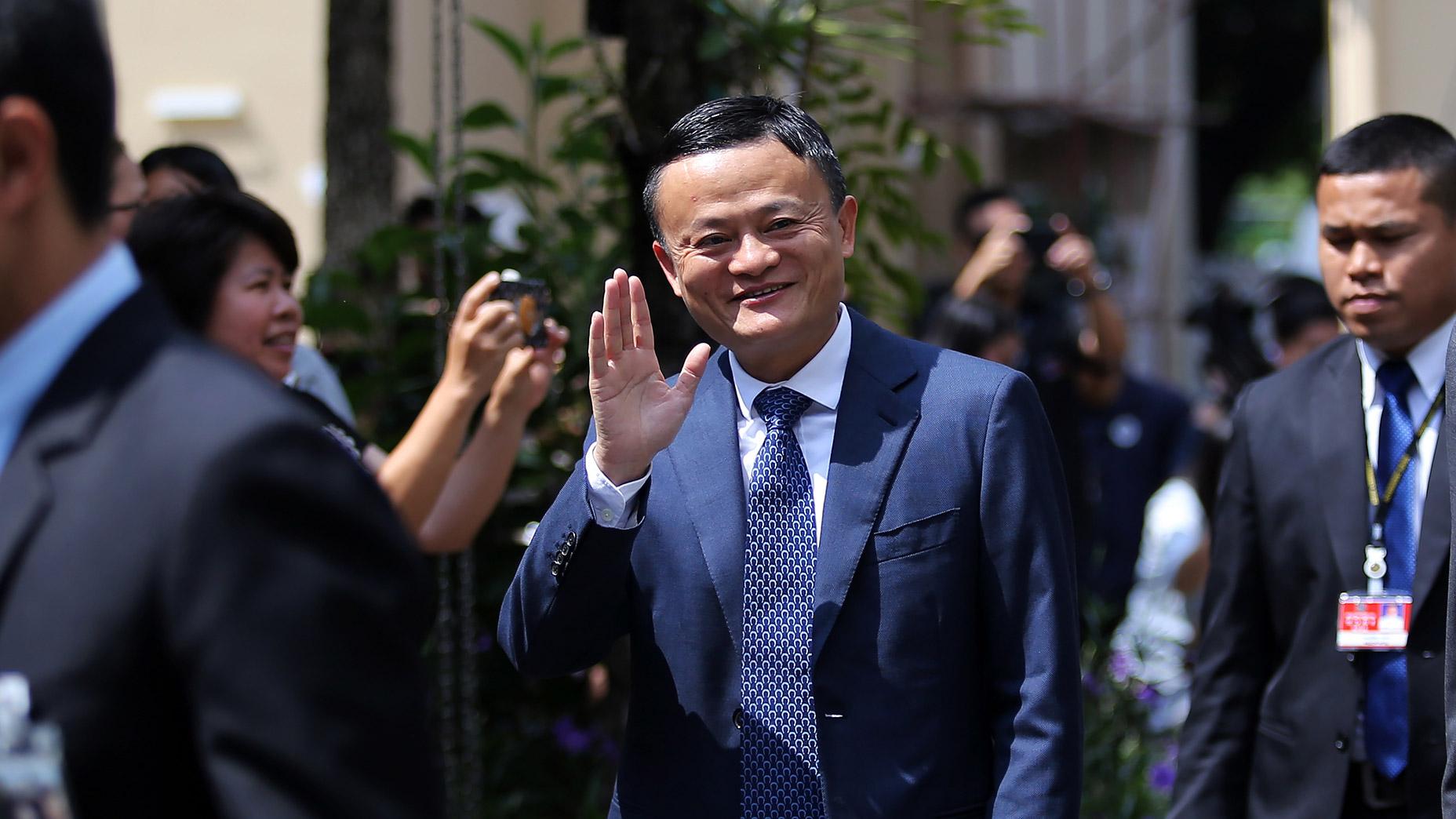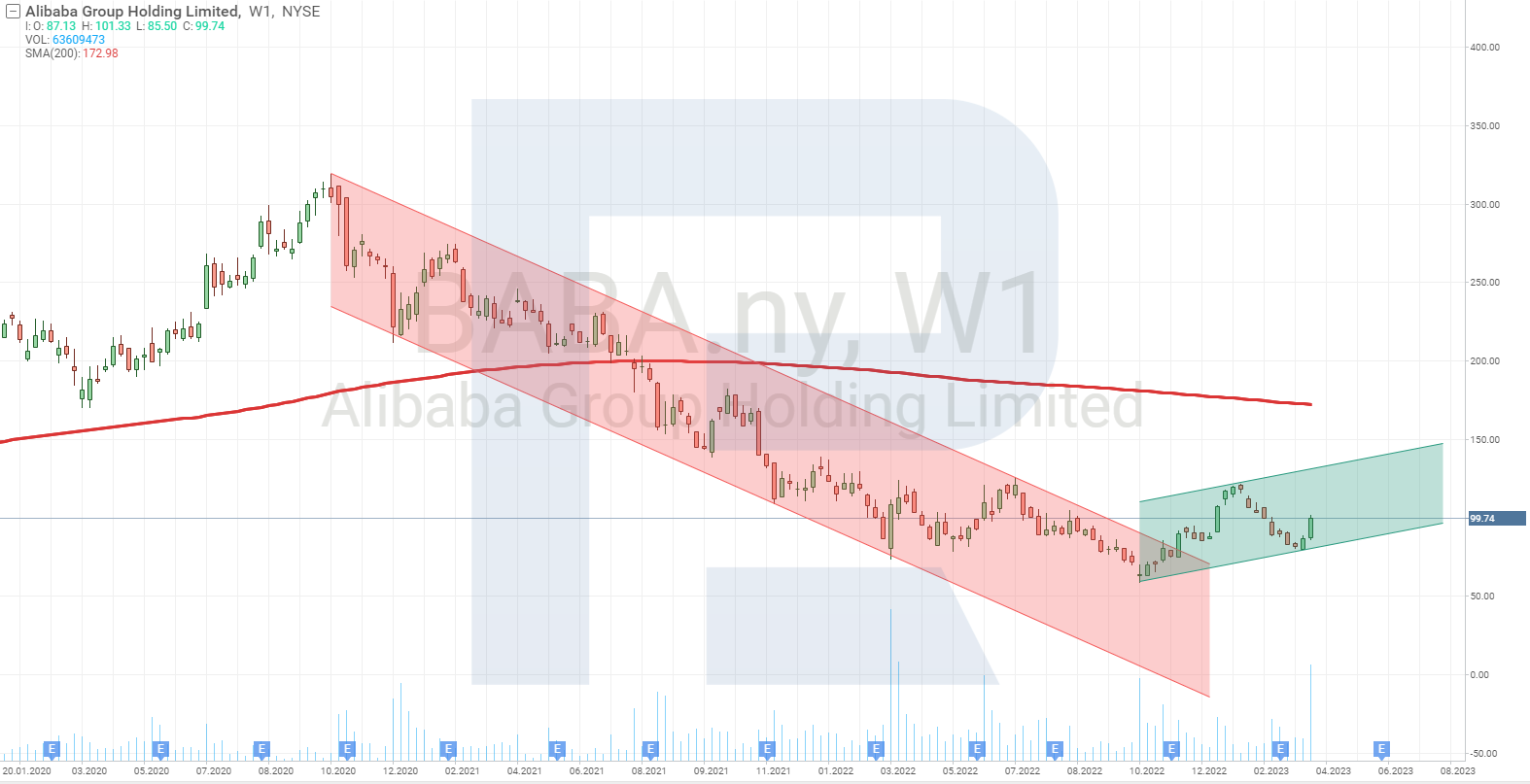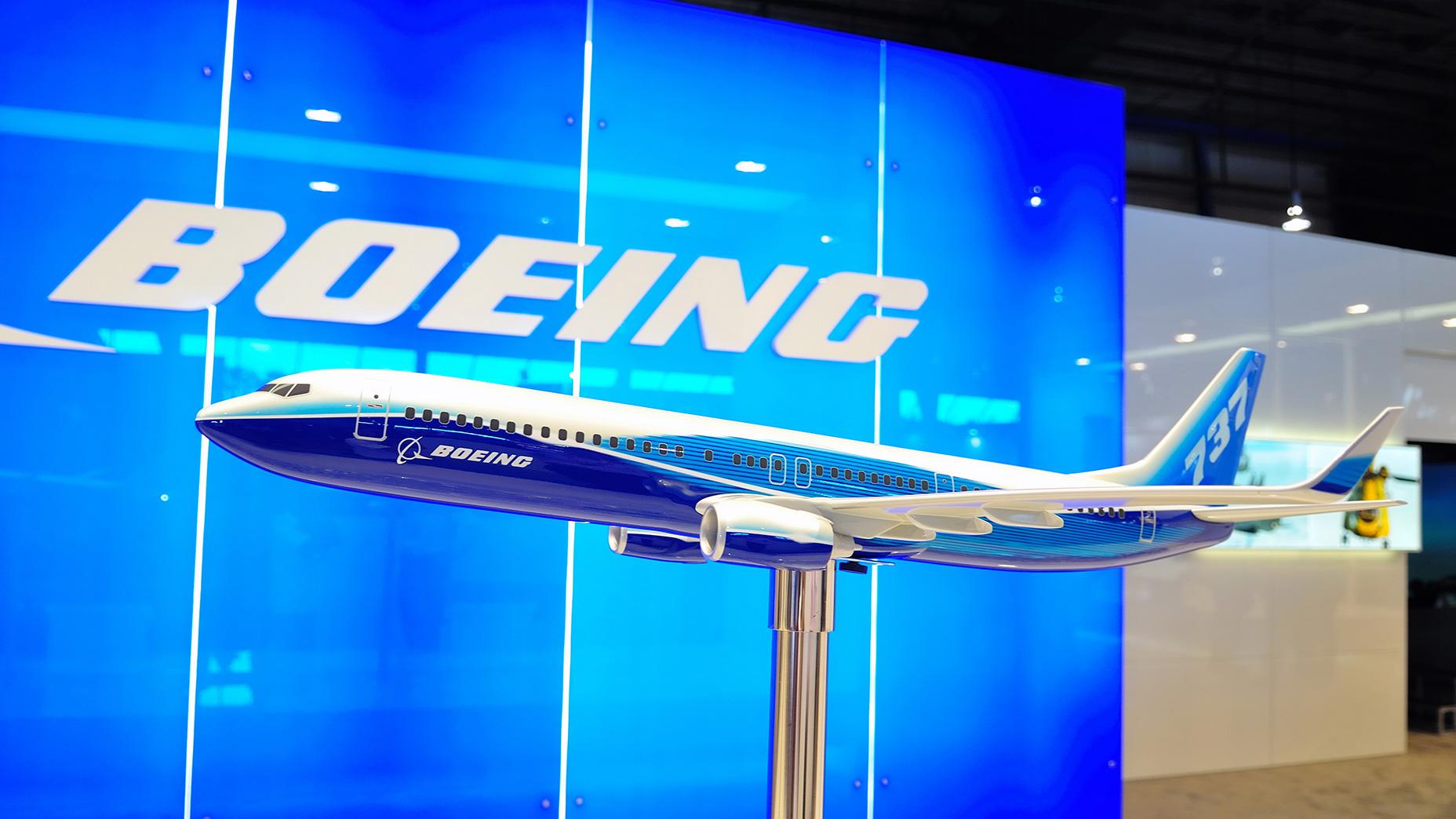Alibaba Group Restructuring: Reasons, Objectives, and Implications

6 minutes for reading
Alibaba Group Holding Limited (NYSE: BABA) announced the largest restructuring in its history on 28 March 2023, and this news sent its shares up rising 14.26% to 98.4 USD by the end of the trading session. Let us take a detailed look at the company’s business model, find out which of its divisions are generating the highest revenues, list the advantages and disadvantages of splitting the business, and study how the shares of its competitors reacted to the news of Alibaba’s restructuring.
What we know about Alibaba Group
Alibaba Group Holding Limited is a Chinese company that specialises in electronic commerce, retail sales, logistics, cloud, streaming and financial services, AI technology, and entertainment content production. Jack Mǎ Yún founded the company in 1999 in Hangzhou, China.
Alibaba Group development areas
- B2B electronic commerce: the Alibaba.com Internet platform is launched in 1999
- C2C electronic commerce: the Taobao website appears in 2003, and the Alipay online payment service starts operating in 2004
- B2C electronic commerce: the Tmall platform is launched in 2008
- Cloud computing: Aliyun (now Alibaba Clouds) appears in 2009
- Digital media and entertainment: Alibaba Pictures begins operations in 2014, and the media company buys the Youku Tudou streaming service in 2015
Moreover, Alibaba Group Holding Limited has invested in artificial intelligence, logistics, healthcare, and financial technology. Nowadays, it is one of the world’s largest corporations with a highly diversified business.
Alibaba Group Q4 2022 revenue distribution by segment
Alibaba Group Holding Limited’s revenues for the fourth quarter of 2022 reached 247 billion USD, recording a 2.13% growth from the same period in 2021. Below are the consolidated data for four segments:
- Core commerce accounts for 219 billion USD or 89% of total quarterly revenue. This segment includes the online trading resources Taobao Marketplace, Tmall, Juhuasuan, AliExpress, Lazada, and Alibaba.com; logistic company Cainiao Network, and the Ant Group consumer credit services.
- Cloud computing accounts for 16.1 billion USD or 6.5% of total quarterly revenue, with Alibaba Cloud being the largest contributor in this segment.
- Digital media and entertainment accounts for 9.1 billion USD or 3.7% of total quarterly revenue. Youku, Alibaba Pictures, Alibaba Music, UCWeb, and more.
- Innovation initiatives and others accounts for 1.7 billion USD or 0.7% of total quarterly revenue. This segment includes AutoNavi, DingTalk, Tmall Genie, and other products.
Monopolising the Chinese market
Alibaba Group Holding Limited is the largest electronic commerce platform in China: at the beginning of 2022, the total number of its active users exceeded 903 million. It dominates in other sectors of the Chinese market as well, including cloud computing and online payments.
Such a state of affairs has always attracted particular attention to the technology giant from Chinese regulators who have been attempting to prevent it from monopolizing the market. As a reminder, in October 2020, the State Administration for Market Regulation (SAMR) in China launched an investigation into the business of Alibaba Group Holding Limited. This resulted in the company being fined a record 2.8 billion USD for violating antitrust laws.
The decline in Alibaba Group shares
Alibaba Group Holding Limited’s shares reached their all-time high of 319 USD per unit in October 2020 but declined as soon as the antitrust investigation was launched. By October 2022, the shares had dropped by 81% to 58 USD. The capitalisation of the corporation over that period decreased from 840 billion to 152 billion USD.

Investors showed increased interest in the shares of Alibaba Group after their price dropped below 100 USD per unit, and this can be seen in the increased trading volumes. By 23 January 2023, the shares had risen from 58 to 120 USD but later dropped to 80 USD. The news of the restructuring sparked the interest of investors: at the time of writing, the shares were trading at 100 USD per unit.
Alibaba Group’s business split
The pressure from the Chinese government pushed Alibaba management to look for new opportunities for further business development. As a result, it was decided to split the business of Alibaba Group Holding Limited into six business groups as follows:
- Alibaba Cloud Intelligence will work with cloud services and AI technologies.
- Taobao Tmall Commerce Group will specialise in digital trading platforms, including Taobao and Tmall.
- Local Services Group will deal with food delivery services and hotel booking services, as well as mapping services.
- Cainiao Smart Logistics is a logistics business.
- Global Digital Commerce Group will specialise in international electronic commerce enterprises, such as AliExpress and Lazada, as well as financial services.
- Digital Media and Entertainment Group will unite streaming services and the cinema business.
Each business group will be managed by its own CEO and a board of directors; and will be able to raise outside financing independently and conduct an IPO. The only exception will be Taobao Tmall Commerce Group which will remain a subsidiary under the full control of Alibaba Group Holdings Limited.
Advantages and disadvantages of the Alibaba Group split
The possible advantages are:
- Less pressure from Chinese regulators
- Increased competitiveness level in the market
- Improved quality of products and services
- Increased shareholder value
- An opportunity for market players to invest in a specific area of business
The possible disadvantages are:
- Reduced synergy between the different business units
- The necessity to collect user data individually for each company
- A possible decrease in revenues during the transition period
How competitors reacted
The news of Alibaba Group Holdings Limited’s major restructuring sent the shares of other large technology corporations in China up, rising sharply. On 28 March, Baidu Inc. (NASDAQ: BIDU) stock gained 4.73% to 159.96 USD, and JD.com Inc. (NYSE: JD) gained 4.45% to 41.55 USD.
It became known on 30 March that Jingdong Property Inc. and Jingdong Industrials Inc., the subsidiaries of JD.com Inc., filed for IPOs on the Hong Kong stock exchange. This news sent the quotes of the parent company up, rising by 7.82% to 44.40 USD.
Summary
Alibaba Group Holdings Limited is planning to split its business into six independent units: Alibaba Cloud Intelligence, Taobao Tmall Commerce Group, Local Services Group, Cainiao Smart Logistics, Global Digital Commerce Group, and Digital Media and Entertainment Group. This will allow the corporation to ease the pressure from Chinese regulators, increase its competitiveness in the market, and raise its shareholder value.
This news had a positive impact not only on the stock of the star of this article but also on the shares of other major Chinese tech companies. According to CNBC, Morgan Stanley analysts believe that the restructuring of Alibaba Group Holdings Limited and the lifting of quarantine restrictions in China could lead to a 100% rise in Alibaba Group’s share price.
* – Past performance is not a reliable indicator of future results or future performance.
The material presented and the information contained herein is for information purposes only and in no way should be considered as the provision of investment advice for the purposes of Investment Firms Law 87(I)/2017 of the Republic of Cyprus or any other form of personal advice or recommendation, which relates to certain types of transactions with certain types of financial instruments.
















 are complex instruments and come with a high
are complex instruments and come with a high  of losing
of losing  rapidly due to
rapidly due to  . 65.68% of retail investor accounts lose
. 65.68% of retail investor accounts lose  when trading
when trading  with this provider. You should consider whether you understand how CFDs work and whether you can afford to take the high
with this provider. You should consider whether you understand how CFDs work and whether you can afford to take the high